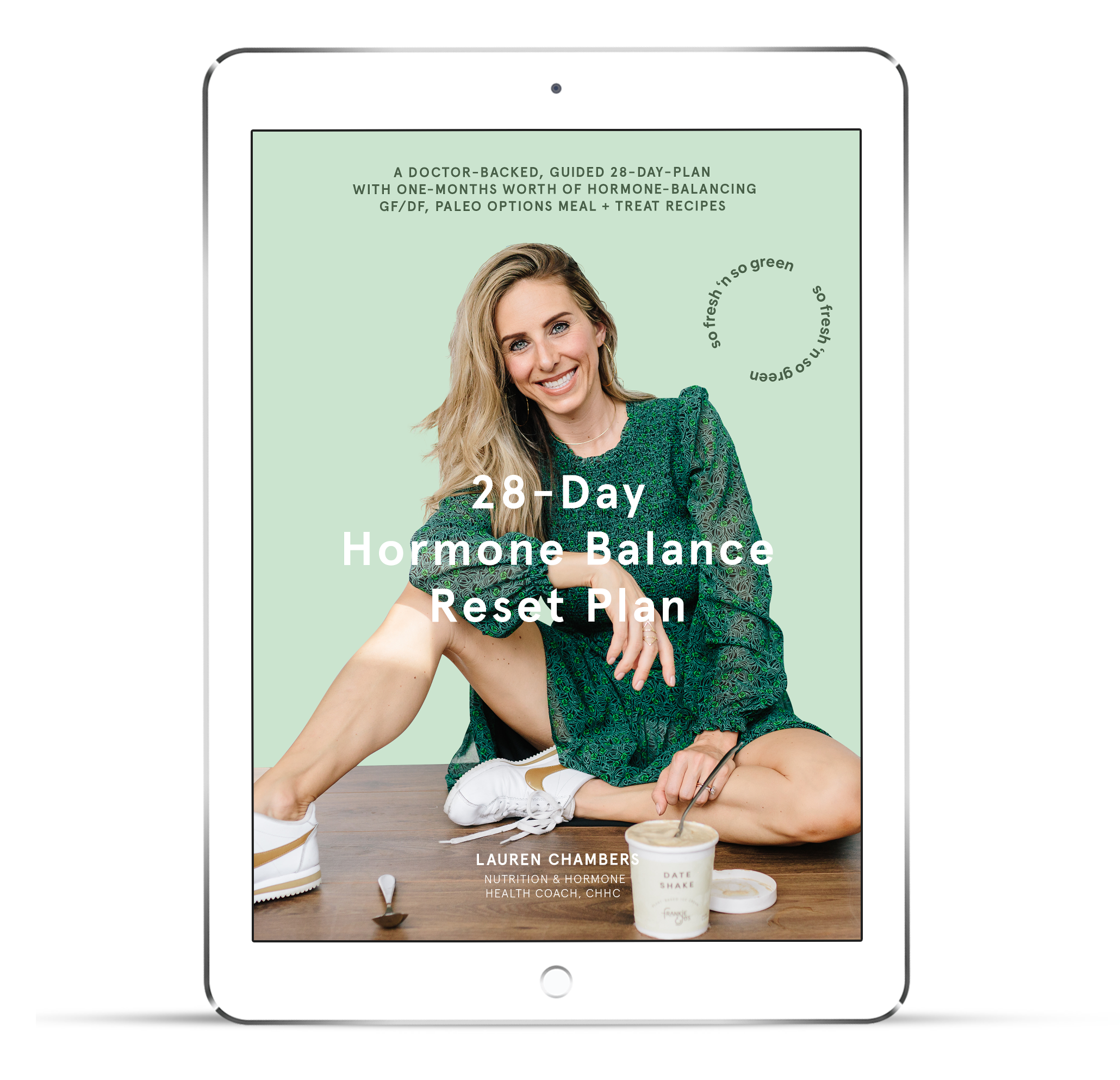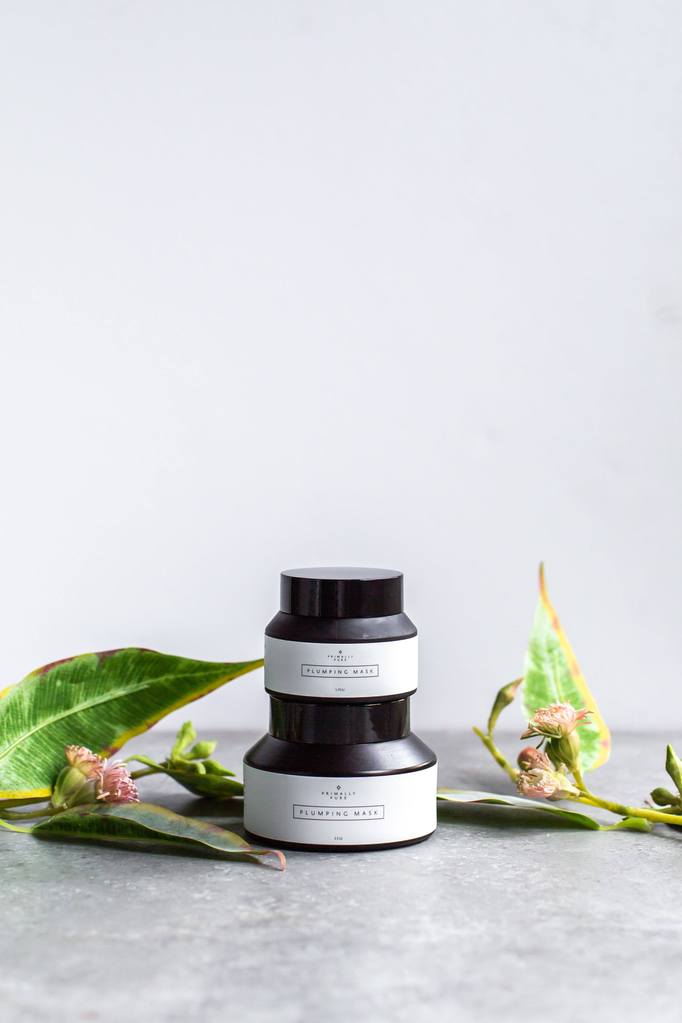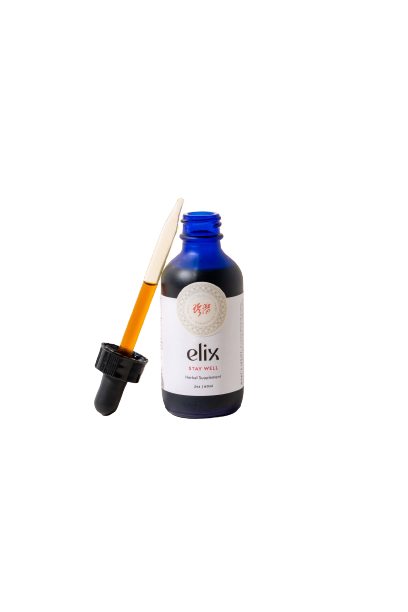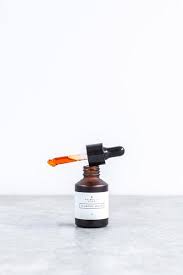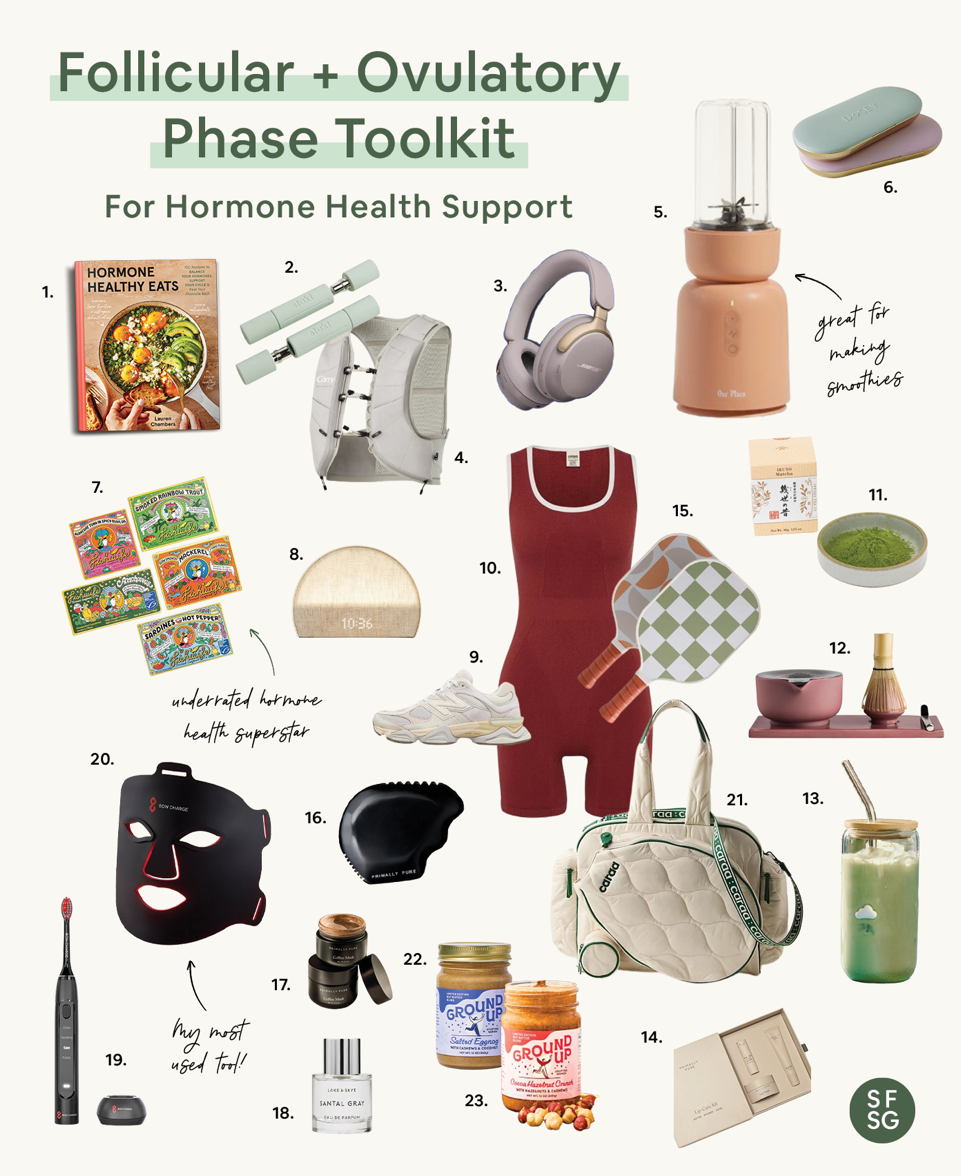recipes
lifestyle
wellness
motherhood
mindset
About
E-Books
Blog
Freebies
partnerships
hi, i'm lauren!
hey there!
I’m on a hot mission to help you balance your hormones & live your best life.
categories
Home
Quiz
Get In Touch
The Course
search:
Cookbook
Recipe key
GF
VG
P
Vegan
Gluten Free
Paleo
DF
Dairy-Free
download now
Join Hormone Healthy Eats!
Become a SFNSG insider to get my monthly Substack, Hormone Healthy Eats! Packed with the latest hormone-healthy recipes
+ tips.
jump to recipe >
Unless you’ve done diagnostic testing (which I do encourage at some point), you’re probably somewhat unsure of the root cause of your hormonal imbalance symptoms, as well as how many (or what kind) of hormonal imbalance you actually have.
More than likely you know something has shifted or feels off in your body, and you’re here to alleviate those symptoms keeping you from feeling and looking your best.
Truly, the more you know about your specific hormonal imbalances (triggers, causes, etc.) the more effectively you can heal them moving forward.
So if you’re not quite sure what hormonal imbalance you have, this post will help you narrow in on your symptoms (as well as root causes) in order to heal them effectively moving forward.
You can also take this free hormonal imbalance quiz to investigate further.
***Keep in mind your hormones are intricately linked, so chances are you most likely have more than one imbalance at play (especially if the issue is ongoing or chronic).
Need a detailed plan with delicious recipes, effective lifestyle tips and targeted supplements to support you in healing your hormonal imbalances? Learn more here.
THE MOST COMMON HORMONAL IMBALANCES + SYMPTOMS IN WOMEN AND WHAT TO DO ABOUT EACH
HIGH CORTISOL
Triggers/Causes of High Cortisol
- + Chronic mental, emotional, or physical stress
- + Over-exercising, extreme dieting, and eating disorders
- + Food allergies or sensitivities such as wheat and other gluten-containing products, dairy, corn, soy, and sugar
Common Symptoms of High Cortisol Include
- + Feeling tired yet wired
- + Difficulty falling or staying asleep
- + Oligomenorrhea (infrequent periods)
- + Amenorrhea (the absence of menstruation)
- + Decreased fertility
- + Inability to concentrate, or constantly feeling distracted
- + Anxiety or nervousness
- + High blood pressure
- + High blood sugar
Hormone-Balancing Tips for High Cortisol
- + Lower sugar intake (which triggers cortisol release) by swapping refined flours and packaged baked goods for refined-sugar-free options (all recipes in this plan work)
- + Eat more dark chocolate (70% cacao or higher) to help satisfy your sugar cravings while reducing your cortisol levels
- + Work to support fatigued adrenals by developing a nightly sleep routine and consider supplements like 5-HTP or a B-Complex Formula **Highly recommend consulting with your practitioner on these first
- + Swap intense forms of exercise like cardio or HIIT for more low-impact, relaxing options like yoga or reformer pilates
- + Seek out the most effective testing methods to get concrete answers (see testing section in this guide)
LOW CORTISOL
Triggers/Causes of Low Cortisol
- + Long periods of high cortisol output (see above)
- + Addison’s Disease
- + Experience of significant trauma
- + Congenital Adrenal Hyperplasia (a collection of genetic disorders that can affect the adrenal glands)
Common Symptoms of Low Cortisol Include
- + Fatigue, ranging from low-level, but chronic, to crippling fatigue
- + Difficulty staying asleep
- + Difficulty waking in the morning, and/or feeling unrested after getting adequate sleep
- + Low blood pressure
- + Dizziness, especially upon standing up
- + Decreased tolerance for stress
- + Crying for no apparent reason
- + Feeling depressed or unable to cope
Hormone-Balancing Tips For Low Cortisol
- + Try swapping alcohol or caffeine (which interfere with your sleep cycle and can contribute to fatigued adrenals) with a hormone-balancing hot chocolate or an herbal tea like peppermint or ginger
- + Add in more healing, nutrient-rich foods like bone broth, wild-caught fish abundant in omega-3’s or probiotic-rich foods like coconut yogurt
- + Work to support fatigued adrenals by developing a nightly sleep routine, and consider supplements like 5-HTP or a B-Complex Formula **I highly recommend consulting with your practitioner on these first
- + Sneak in relaxing forms of self-care daily. This could be keeping your calendar open (i.e. saying no to social obligations), a yoga flow, meditation practice or walking outside
- + Seek out the most effective testing methods to get more concrete answers (see testing section in this guide)
LOW PROGESTERONE
Triggers/Causes of Low Progesterone
- + Long-term stress, or high cortisol (see above)
- + Exposure to synthetic estrogens or xenoestrogens
- + Hormonal birth control, most notably the birth control pill
- + Lack of ovulation
Common Symptoms of Low Progesterone Include
- + Difficulty getting or staying pregnant (infertility)
- + Breakthrough bleeding during the second half of the menstrual cycle
- + PMS or PMDD
- + Menstrual migraines
- + A heavier flow during menstruation
- + Irregular cycles
- + Bloating in the abdomen
- + Swollen and/or painful breasts
Hormone-Balancing Tips for Low Progesterone
- + Incorporate more stress-management into your daily routine (yoga, breathing, meditation, baths, walks, nature, etc.)
- + Eat more foods that support progesterone production, such as walnuts, bananas, cruciferous veggies, whole grains and shellfish
- + Try taking a magnesium supplement
- + Start swapping endocrine disrupting beauty products for cleaner options
- + Seek out the most effective testing methods to get more concrete answers (see testing section in this guide)
EXCESS ESTROGEN
Triggers/Causes of Excess Estrogen
- + High cortisol (see above) which lowers progesterone output and blocks progesterone receptors
- + Excessive consumption of alcoholic beverages
- + Xenoestrogens, like BPA and phthalates, which mimic estrogen in the body
- + Carrying excess weight
Common Symptoms of Excess Estrogen Include
- + Heavy bleeding
- + Breast tenderness or cysts
- + PMS or PMDD
- + Fibroids
- + Endometriosis
- + Menstrual migraines
- + Moodiness and frequent meltdowns
- + Depression or weepiness
- + Mid-cycle pain
- + Brain fog
Hormone-Balancing Tips For Excess Estrogen
- + Focus on detoxifying recipes that support your body in eliminating excess estrogen, especially those that contain cruciferous veggies and herbs like cilantro
- + Try replacing any endocrine disrupting plastic containers with glass & toxic beauty products with cleaner options
- + Consider taking a DIM supplement, which helps your body get rid of excess estrogen
- + Seek out the most effective testing methods to get more concrete answers (see testing section in this guide)
LOW ESTROGEN
Triggers/Causes of Low Estrogen
- + High stress, resulting in high cortisol levels
- + Disordered eating
- + Nutrient deficiencies, due to poor dietary practices or poor absorption
- + Over-exercising, especially in conjunction with calorie restriction
- + Hormonal birth control, most notably the birth control pill
Common Symptoms of Low Estrogen Include
- + Oligomenorrhea
- + Amenorrhea
- + Low sex drive
- + Vaginal dryness
- + Painful sex
- + Hot flashes or night sweats
- + Joint pain
- + Dry skin and eyes
- + Depression
- + Melasma
- + Poor cognitive function, especially memory
- + Menopause/perimenopause
Hormone-Balancing Tips for Low Estrogen
- + Consider switching to a non-hormonal form of birth control (if currently on one)
- + Eat more nutrient-rich foods that support estrogen production such as flax and pumpkin seeds, whole grains, berries and fresh fruit
- + Seek out the most effective testing methods to get more concrete answers (see testing section in this guide)
EXCESS ANDROGENS
Triggers/Causes of Excess Androgens
- + High insulin levels, which cause the ovaries to produce more testosterone
- + Using hormonal birth control with synthetic progestins
- + Polycystic Ovarian Syndrome (PCOS)
- + High cortisol from chronic stress
- + Excess body fat can cause excess estrogen, which can affect the production and use of androgens in women
- + Congenital Adrenal Hyperplasia
Common Symptoms of Excess Androgens Include
- + Unstable blood sugar, known as hypo- or hyperglycemia
- + Infrequent ovulation
- + Menstrual cycles longer than 35 days
- + Ovarian cysts
- + Mid-cycle pain
- + Acne or oily skin
- + Hair growth on the face
- + Hair loss on the head
- + PCOS
Hormone-Balancing Tips For Excess Androgens
- + Make sure you’re drinking plenty of water in between meals (which helps to curb snacking + balance blood sugar)
- + Balance out insulin levels by ensuring each meal/snack has a good balance of protein, fat and fiber (every single recipe in this plan is applicable)
- + Try adding more Ceylon Cinnamon to your beverages or taking a magnesium supplement
- + Seek out the most effective testing methods to get more concrete answers (see testing section in this guide)
LOW ANDROGENS
Triggers/Causes of Low Androgens
- + Dysfunction in the adrenal glands or the ovaries
- + Ovarian removal, low ovarian function or ovarian failure
- + The birth control pill, or other types of hormonal birth control
Common Symptoms of Low Androgens Include
- + Low libido
- + Painful sex
- + Less powerful orgasm
- + Lower self-confidence
- + Lack of lubrication
- + Less muscle mass
- + Decreased motivation
Hormone-Balancing Tips for Low Androgens
- + Consider switching to a non-hormonal form of birth control (if you’re currently on one)
- + Work to support fatigued adrenals by developing a nightly sleep routine, and consider supplements like 5-HTP or a B-Complex Formula **I highly recommend consulting with your practitioner on these first
- + Load up on cruciferous veggies like cabbage, cauliflower, broccoli, kale, arugula, bok choy, etc. that will support your adrenals
- + Seek out the most effective testing methods to get more concrete answers (see testing section in this guide)
LOW THYROID
Triggers/Causes of Low Thyroid
- + Inadequate production of thyroid hormone due to excess or insufficient cortisol production
- + Endocrine disrupting chemicals known as xenoestrogens
- + Nutrient deficiencies like selenium, iodine, vitamin D, and certain amino acids
- + Gut conditions which affect the body’s ability to absorb nutrients
- + Poor conversion of T4 to the active T3 hormone
- + Hashimoto’s thyroiditis – an autoimmune condition in which the body attacks the thyroid
- + Birth/postpartum
Common Symptoms of Low Thyroid Include
- + Dry skin and hair
- + Hair loss
- + Brittle nails
- + Cold hands and feet
- + Sensitivity to cold
- + Fatigue
- + Depression
- + Unexplained, rapid weight gain or stubborn fat that is hard to lose
- + Heavy periods
- + Low sex drive
- + Fertility challenges or miscarriage
Hormone-Balancing Tips for Low Thyroid
- + Consume foods rich in minerals your thyroid needs to thrive. This post has some great options
- + Steer clear of gluten, grains, legumes and minimize sugar, which can trigger a thyroid autoimmune condition such as Hashimoto’s
- + As long as iodine levels in the body are adequate, the benefits of eating cruciferous veggies far outweigh the harm. That being said, I advise you to eat them cooked, which significantly reduces goitrogenic compounds that can interfere with thyroid health
- + Consider switching to a non-hormonal form of birth control (if on one) as birth control pills deplete the body of crucial nutrients required for the thyroid to work properly
- + Try taking a supplement rich in trace minerals that your thyroid depends on to function optimally
- + Start swapping endocrine and thyroid disrupting beauty products for cleaner options
- + Seek out the most effective testing methods to get more concrete answers (see testing section in this guide)
MOST COMMON COMBINATIONS OF HORMONAL IMBALANCES IN WOMEN
As you can probably tell after reading this, your hormones tend to have a domino effect in your body (i.e. when one is thrown out of balance it will most likely lead to other imbalances).
The most common combinations of hormone imbalances in women are —
+ High estrogen + low progesterone
+ High cortisol + low progesterone – or low sex hormones in general
+ Low estrogen + low testosterone
MOST COMMON CONDITIONS ASSOCIATED WITH HORMONAL IMBALANCES IN WOMEN
If untreated over time, many of these hormonal imbalances can lead to other conditions such as —
- + HPA Axis Dysfunction (commonly known as adrenal fatigue)
- + Thyroid Disorders such as Hypothyroidism (under active) or Hyperthyroidism (overactive)
- + Infertility
- + PCOS
- + PMS
- + PMDD (premenstrual dysphoric disorder) a more severe, often debilitating form of PMS
- + Endometriosis
- + Dysmenorrhea (painful menstruation)
- + Oligomenorrhea (lighter than normal or less frequent periods)
- + Amenorrhea (absent periods)
- + Perimenopause/Menopause
If you already have these conditions, it’s important to treat them holistically and take into account the root cause of the condition (often stemming from a hormonal imbalance). On the flip side, working to balance out your hormones now can prevent you from some less than ideal conditions down the road.
BOTTOM LINE
As you can see there’s a lot of common themes, causes and correlations with hormonal imbalances, mostly attributed to high levels of stress, weight gain, exposure to toxins (alcohol, processed foods, cleaning and beauty supplies, plastics), hormonal birth control and disordered eating or over-exercising.
Overall, the best advice I can give you is to trust and listen to your body. If you feel like something is off, imbalanced, or like you’re doing “everything right” and not seeing results, chances are you’re right. Don’t ignore your intuition, you are the expert of your own body.
If you’re looking for more support and a detailed plan to help you balance your hormones and address your symptoms at the root cause, check out my go-to guide here.
OTHER HORMONE BALANCING RESOURCES YOU MAY FIND HELPFUL
+ Your Guide To Cooking For Natural Hormone Balance
+ Cycle-Syncing Cheatsheet To Understanding + Supporting Your Monthly Cycle
+ How To Naturally Balance Your Hormones After Birth Control
Shop Hormone-Balancing Faves
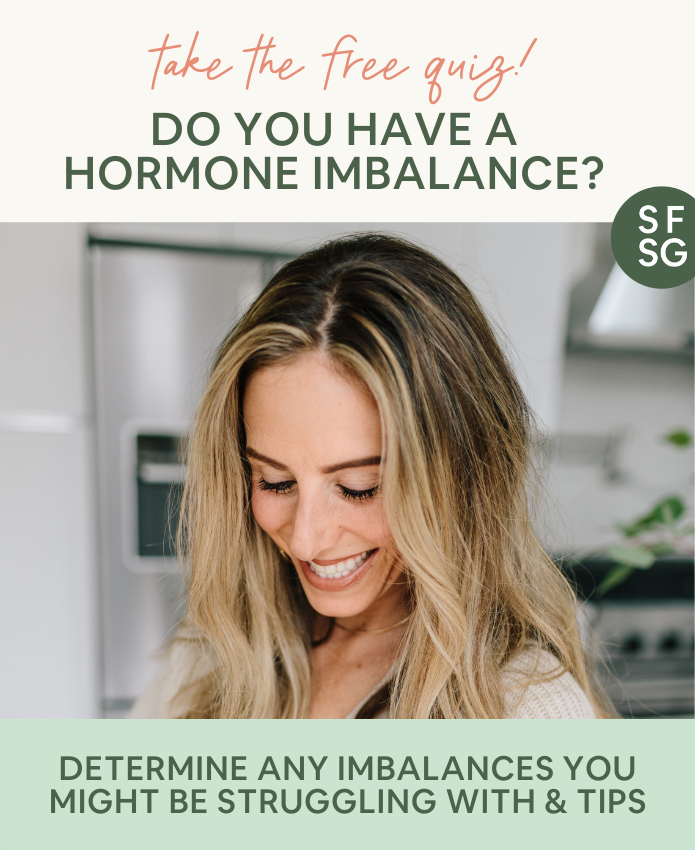
If you loved that...

01.

02.

03.

04.
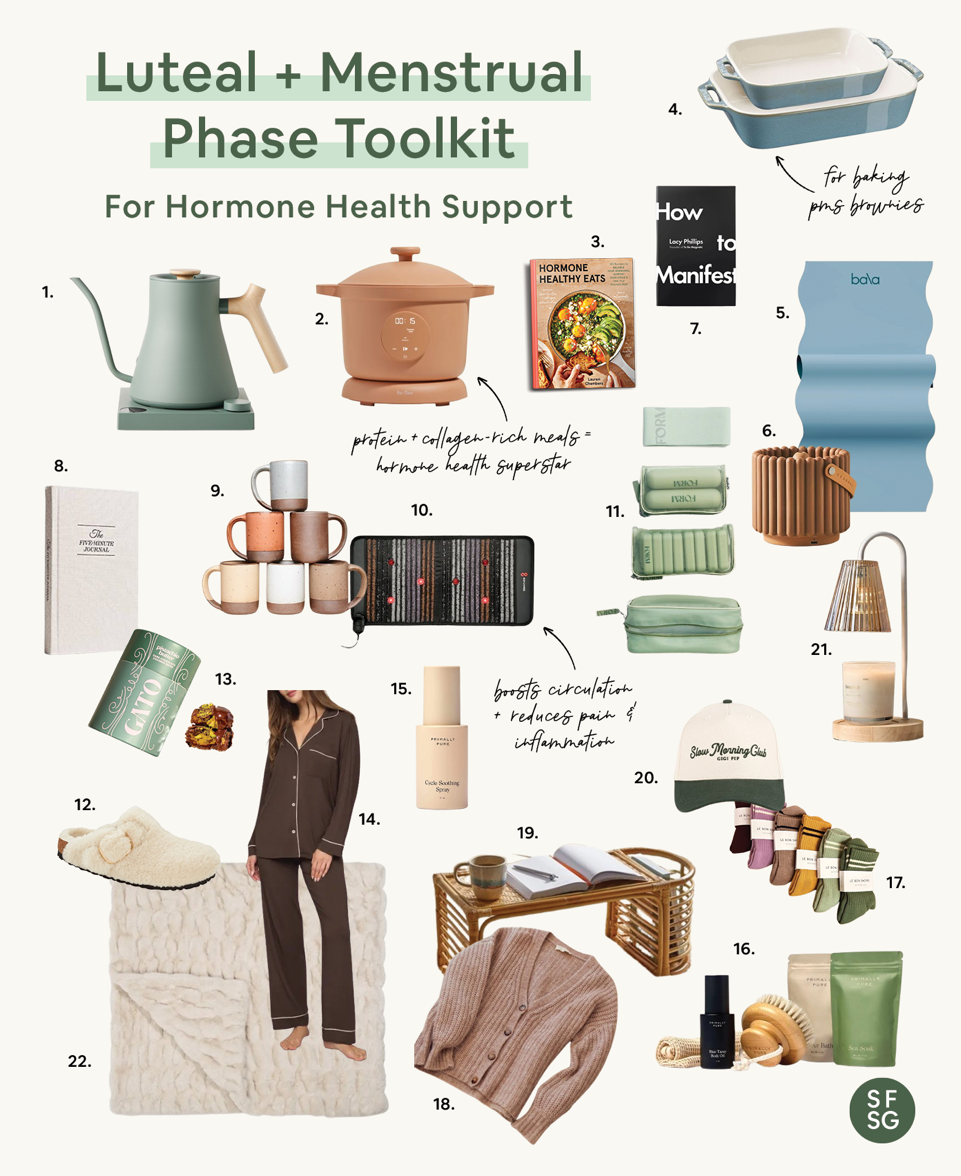
05.
hey!
Keep Browsing
Site
Keep Browsing
Site
the
about
e-books
blog
downloads
quiz
Welcome friend, I'm lauren.
I’m honored to support you on your journey to optimal hormone health + happiness. Thanks for being here babe.
